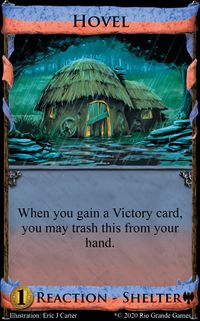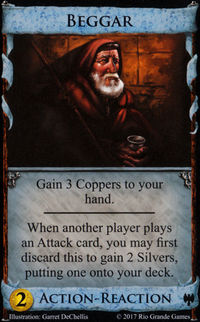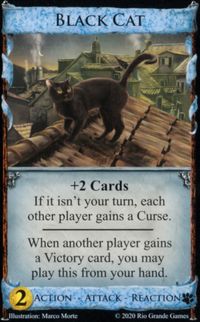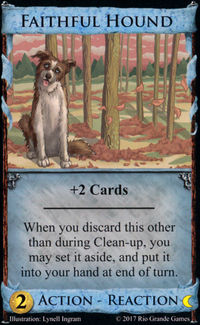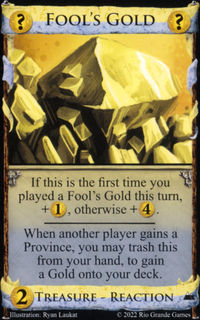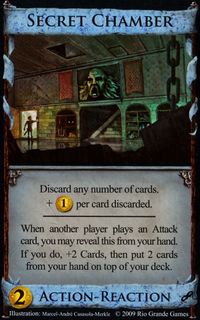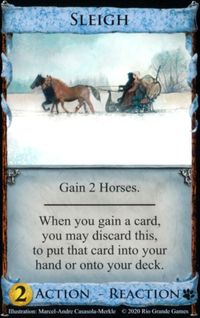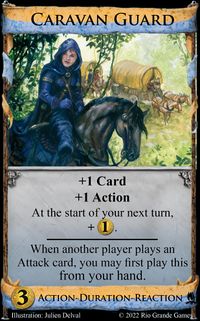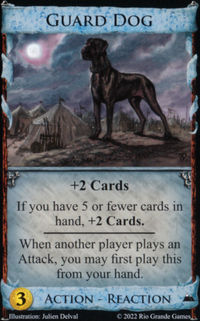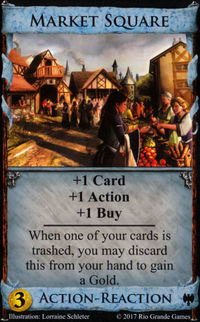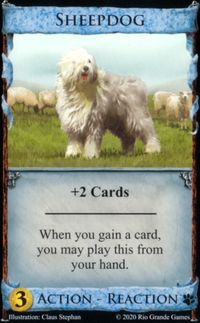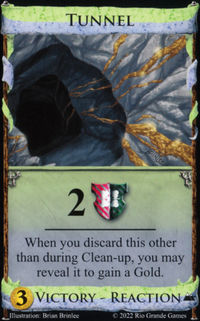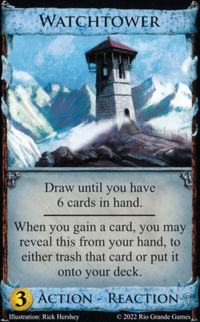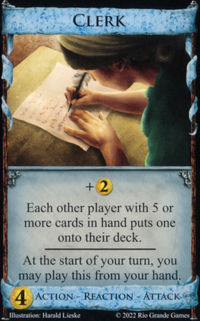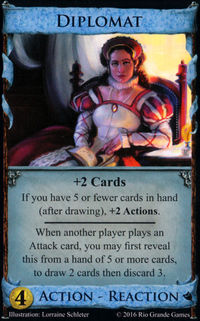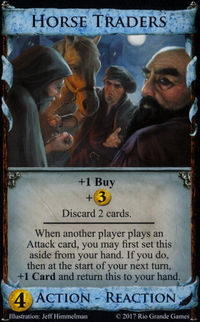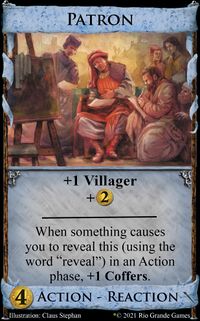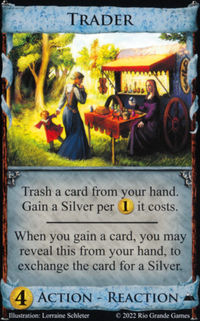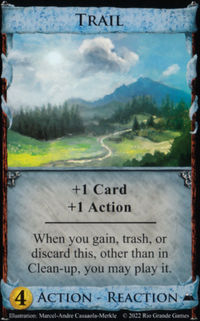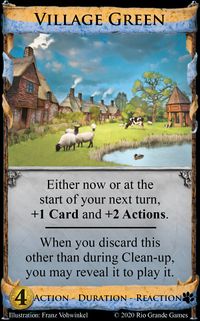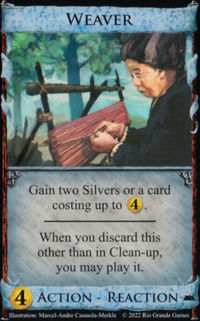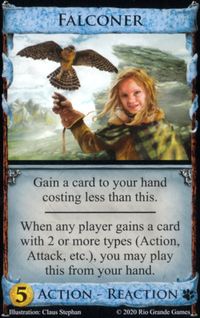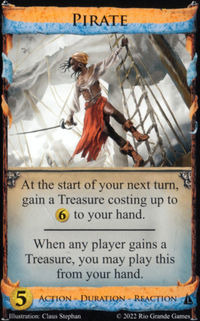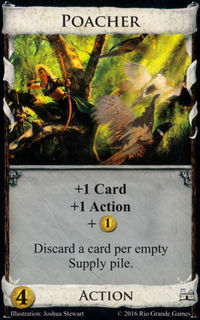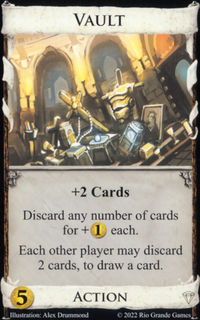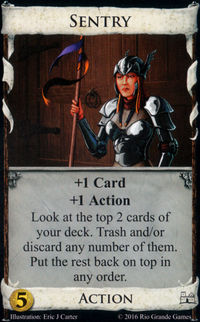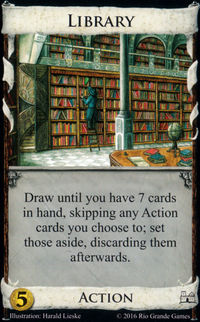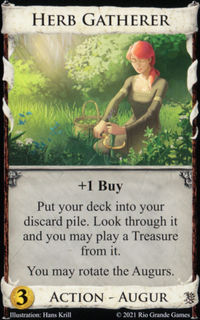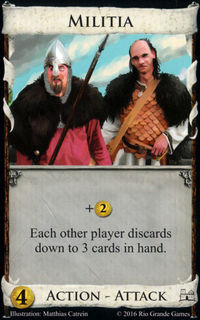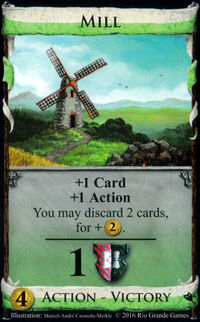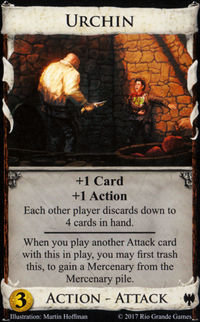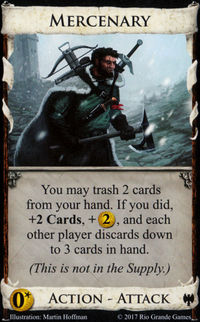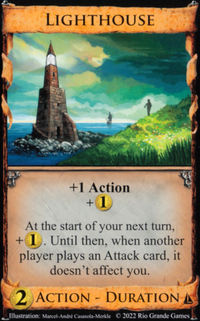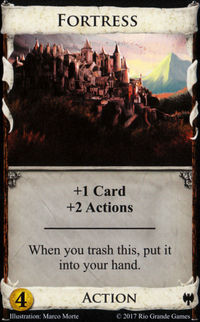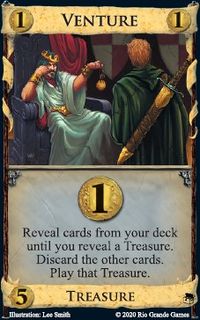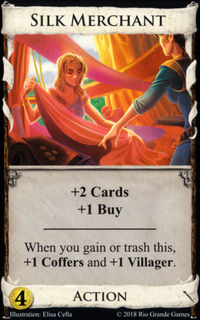Reaction
Dirkdebeule (Talk | contribs) (→When discarded) |
(→Rules) |
||
| Line 15: | Line 15: | ||
There are no official rules for Reaction cards in general. How to use them is detailed in the FAQ for each individual card, and in the rules descriptions of the specific mechanics on those cards. But there are official rules for certain kinds of Reactions. | There are no official rules for Reaction cards in general. How to use them is detailed in the FAQ for each individual card, and in the rules descriptions of the specific mechanics on those cards. But there are official rules for certain kinds of Reactions. | ||
=== Reactions that can play themselves === | === Reactions that can play themselves === | ||
| − | This includes {{Card|Pirate}}, {{Card|Clerk}}, {{Card|Weaver}}, {{Card|Caravan Guard}}, {{Card|Black Cat}}, {{Card|Sheepdog}}, {{Card|Village Green}}, and {{Card|Falconer}}. | + | This includes {{Card|Pirate}}, {{Card|Clerk}}, {{Card|Guard Dog}}, {{Card|Weaver}}, {{Card|Trail}}, {{Card|Caravan Guard}}, {{Card|Black Cat}}, {{Card|Sheepdog}}, {{Card|Village Green}}, and {{Card|Falconer}}. |
* Playing one of these Reactions using its ability (the text below the dividing line) puts it into play, like playing it normally, but does not use up an Action. | * Playing one of these Reactions using its ability (the text below the dividing line) puts it into play, like playing it normally, but does not use up an Action. | ||
* If you play a card on someone else's turn, you discard it in that turn's Clean-up, unless it is a Duration card with things left to do. | * If you play a card on someone else's turn, you discard it in that turn's Clean-up, unless it is a Duration card with things left to do. | ||
| Line 23: | Line 23: | ||
* Sometimes a condition occurs that allows a Reaction to be played, and that Reaction creates a second condition that allows Reactions to be played. Resolve all Reactions for the new condition and then go back to resolving ones for the first one. For example one player gains a {{Card|Province}}, and another plays {{Card|Black Cat}}. Gaining a {{Card|Curse}} from Black Cat allows players to play {{Card|Sheepdog}}s; after resolving those you would go back to see if players had more {{Card|Black Cat}}s to play. | * Sometimes a condition occurs that allows a Reaction to be played, and that Reaction creates a second condition that allows Reactions to be played. Resolve all Reactions for the new condition and then go back to resolving ones for the first one. For example one player gains a {{Card|Province}}, and another plays {{Card|Black Cat}}. Gaining a {{Card|Curse}} from Black Cat allows players to play {{Card|Sheepdog}}s; after resolving those you would go back to see if players had more {{Card|Black Cat}}s to play. | ||
=== When discarded === | === When discarded === | ||
| − | This includes {{Card|Tunnel}}, {{Card|Trail}}, {{Card|Weaver}}, {{Card|Faithful Hound}}, and {{Card|Village Green}}. | + | This includes {{Card|Tunnel}}, {{Card|Trail}}, {{Card|Weaver}}, {{Card|Faithful Hound}}, and {{Card|Village Green}}. This FAQ is unofficial until Hinterlands 2E, and most of it is a combination of existing FAQs. |
| − | + | * You cannot simply choose to discard these cards; something has to let you or make you discard it. | |
| − | + | * These abilities function whether you discard it on your own turn (e.g. {{Card|Poacher}}) or on someone else's turn (e.g. {{Card|Vault}}). These abilities also function if you discard them from your deck (e.g. {{Card|Sentry}}), or from set aside (e.g. {{Card|Library}}), or from [[Exile]]. The key thing to look for is a card telling you to "discard" cards. | |
| + | * This ability does not function if cards are put into your discard pile without being discarded, such as when you gain the card, or when you put your deck into your discard pile (e.g. {{Card|Herb Gatherer}}). | ||
| + | * This ability does not function during Clean-up, when you normally discard all of your played and unplayed cards. | ||
| + | * If you need to discard down to a certain number of cards (due to {{Card|Militia}}), and you want to discard multiple Reactions that function when discarded, you discard them all at once, and use their Reactions one by one. If one of those Reactions make you shuffle your discard pile, the other Reactions you have yet to use will lose track of themselves. | ||
== Other rules clarifications == | == Other rules clarifications == | ||
Revision as of 12:34, 3 July 2022
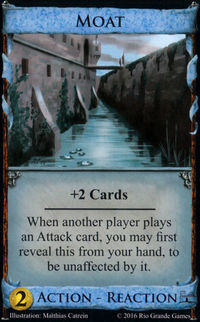
Reaction is a card type. Reaction cards have blue frames, and appear in most expansions. "Reaction" is always a subtype, and the Reaction effect of a card is almost always detailed under a dividing line. As the name would suggest, Reactions have their effects triggered in response to something else happening; when its particular trigger occurs, a Reaction may be revealed by the player in order to get its effect. These triggers usually happen when the card is in its owner's hand or otherwise not visible to opponents; cards with when-gain or when-trash abilities are not considered to be Reactions.
Reaction effects can occur anytime their trigger happens, not just during your own turn.
Contents |
List of Reaction Cards
Cards in italics have been removed.
Hovel
Beggar, Black Cat, Faithful Hound, Fool's Gold, Moat, Secret Chamber, Sleigh
Caravan Guard, Guard Dog, Market Square, Sheepdog, Tunnel, Watchtower,
Clerk, Diplomat, Horse Traders, Patron, Trader, Trail, Village Green, Weaver
Falconer, Pirate
Rules
There are no official rules for Reaction cards in general. How to use them is detailed in the FAQ for each individual card, and in the rules descriptions of the specific mechanics on those cards. But there are official rules for certain kinds of Reactions.
Reactions that can play themselves
This includes Pirate, Clerk, Guard Dog, Weaver, Trail, Caravan Guard, Black Cat, Sheepdog, Village Green, and Falconer.
- Playing one of these Reactions using its ability (the text below the dividing line) puts it into play, like playing it normally, but does not use up an Action.
- If you play a card on someone else's turn, you discard it in that turn's Clean-up, unless it is a Duration card with things left to do.
- If playing one of these Reactions draws you another Reaction that can be used at the same time, you can use it, and so on. For example, you might have one Black Cat in hand when an opponent gains a Province, play it, draw another, play it, draw another, play it.
- When playing one of these Reactions, you can choose to use a Way if there is one.
- If multiple players want to do things at the same time - such as play Reactions - the player first in turn order (starting from the player whose turn it is) goes first. This may change who wants to do what; after each thing, start again from the first player and see who has things to do.
- Sometimes a condition occurs that allows a Reaction to be played, and that Reaction creates a second condition that allows Reactions to be played. Resolve all Reactions for the new condition and then go back to resolving ones for the first one. For example one player gains a Province, and another plays Black Cat. Gaining a Curse from Black Cat allows players to play Sheepdogs; after resolving those you would go back to see if players had more Black Cats to play.
When discarded
This includes Tunnel, Trail, Weaver, Faithful Hound, and Village Green. This FAQ is unofficial until Hinterlands 2E, and most of it is a combination of existing FAQs.
- You cannot simply choose to discard these cards; something has to let you or make you discard it.
- These abilities function whether you discard it on your own turn (e.g. Poacher) or on someone else's turn (e.g. Vault). These abilities also function if you discard them from your deck (e.g. Sentry), or from set aside (e.g. Library), or from Exile. The key thing to look for is a card telling you to "discard" cards.
- This ability does not function if cards are put into your discard pile without being discarded, such as when you gain the card, or when you put your deck into your discard pile (e.g. Herb Gatherer).
- This ability does not function during Clean-up, when you normally discard all of your played and unplayed cards.
- If you need to discard down to a certain number of cards (due to Militia), and you want to discard multiple Reactions that function when discarded, you discard them all at once, and use their Reactions one by one. If one of those Reactions make you shuffle your discard pile, the other Reactions you have yet to use will lose track of themselves.
Other rules clarifications
Using the Reaction effect of a card does not necessarily involve playing the card (or putting it in the play area or carrying out its on-play effects); for instance, when you reveal a Moat to protect yourself from an Attack, the Moat remains in your hand and does not give you +2 Cards. There are a handful of Reaction cards (e.g., Caravan Guard) that do cause themselves to be played as part of their Reaction effects; their text specifically says that they may be played at that time.
Some Reaction cards' abilities instruct a player to discard them, trash them, play them, or set them aside when they are revealed for their Reaction effects. In the absence of such instructions, after being revealed, the card returns to wherever it was revealed from before the rest of its abilities are resolved. For instance, if one player plays an Attack card and another reveals a Moat as a Reaction, the Moat returns to the second player's hand and may be revealed again against future Attacks, and may be played (as an Action) on their next turn. In such cases, it is even permissible to reveal the same Reaction multiple times in response to the same event; however, Reaction abilities are balanced in such a way that doing so rarely has any additional effect.
It is permissible to reveal a Reaction from one's hand in response to an event even if the Reaction was not yet in hand when the triggering event took place, provided that the ability that puts the Reaction in hand was also triggered by the same event that triggered the Reaction. For instance, if you gain a Curse from another player, you may play a Sheepdog, draw another Sheepdog, and play it as well.
If a player has multiple Reactions that react to the same event (e.g. if another player plays an Attack, you could react with both Caravan Guard and Diplomat), you can use those Reactions in any order. If multiple players have Reactions that react to the same event, players go in turn order, starting from the current player. For example, if player 1 gains a Mill on their turn, then they may react with a Sheepdog, player 2 may react with a Black Cat, and player 3 may react with a Falconer. In this case, player 1 goes first.
If another player uses a Reaction, any previous players in turn order get another chance to react (starting with the current player). However, once all players have declined to use a Reaction, no one may use Reactions anymore. Note that this only applies to Reactions and not other abilities. So if player 1 plays an Attack, then player 3 can reveal a Moat, and that would give player 2 a second chance to reveal their own Moat. But if player 1 didn't trash an Urchin for a Mercenary, they don't get a second chance to do so.
Strategy
Many Reaction cards may be revealed in response to an opponent playing an Attack card, and offer some type of defense against some or all Attack cards. Several Reactions that react to events other than Attacks may also offer some protection from Attacks; for instance, Watchtower's Reaction ability protects a player against junking attacks, and its Action ability protects a player against handsize attacks. Since the first Reaction card that many players encounter is Moat, it is a common misconception among new players that all Reactions are revealed in response to Attacks being played, or even that all Reactions offer Moat-like cancellation of Attack effects. However, not all Reactions offer any protection against or interaction with Attacks at all (e.g., Fool's Gold), and not all cards that protect a player against attacks are Reactions (e.g., Lighthouse).
Trivia
In other languages
- Czech: Reakce
- Dutch: Reactie
- Finnish: Vastaveto (lit. counter-move)
- German: Reaktion
- Polish: Reakcja
- Russian: Реакция (pron. ryeaktsiya)
What makes a reaction?
Fortress could have been a reaction. It was a decision to make back when. The argument for not making when-trashed cards reactions - and not making when-gain cards reactions too, or giving them their own color - is that the card is involved. You know. You play Militia; Moat isn't involved, but I could use it. You play Venture; Tunnel and Patron are just going by, but they matter. You buy or trash Silk Merchant; it's right there, in on the action. So we don't need to call attention to it as much as we do Moat / Patron / etc.
But, it certainly could have been that when-gain/trash got colors.Secret History (Menagerie)
Retrospective
